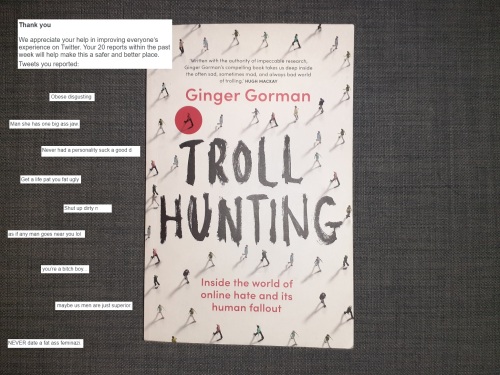Non-fiction book about the motivations and impact of online trolling
Content warning: sexist and racist slurs
I have seen this Canberra journalist and writer speak at quite a few author events over the years, including with Carly Findlay, Margaret Atwood and Miriam Sved. However, despite being familiar with her work in cyberhate and online trolling, I had not actually read her book. Just when COVID-19 lockdown started to kick off, I saw that she had some signed copies available so after a contactless swap, I finally received a copy. After very recently being trolled for the first time (though certainly not harassed online for the first time), I thought it was high time I read it.

“Troll Hunting” by Ginger Gorman is a non-fiction book about the phenomenon of online trolling. The book is divided into three sections: Trolls, Targets and Troll Hunting. Against the background of her own experience on the receiving end of trolling, Gorman walks the reader through what trolling is, who the perpetrators are, who the victims are, the emotional and financial impact of trolling and how effective different mechanisms are in trying to prevent, curb and prosecute trolling.
This is a fascinating and insightful book that lifts the veil a little on something that is almost always hidden by the anonymity of the internet. Gorman uses her investigative journalism skills to connect with numerous and, in some cases, infamous trolls to unpack the motivations behind trolling. As she develops relationships bordering on friendship with her sources, Gorman finds herself asking ethical questions not only of them, but of herself. However, it is Gorman’s ability to empathise with and relate to these (mostly) young men that draws out why they spend their time trolling.
Gorman’s chapter “Deep in the grey” was one of the strongest and most unsettling in the whole book, and we learn that while online trolling has IRL (in real life) impacts on victims, the victims themselves are not always perfect either. The sources themselves are incredibly interesting characters, and by the end of the book, some of the trolls start asking themselves the questions that Gorman asks them about why they participate in trolling. Particularly unnerving is how much trolling is underpinned by sexist and racist beliefs, how organised some trolling is and how far it has to go before legal action is taken. I also really liked the Notes in the margins where Gorman provides a frank overview of how being a victim of trolling and writing a book about trolling starts to take a toll on her.
In terms of solutions to trolling, Gorman explores the pros and cons of stronger legislation, complaints-handling agencies, better training of police and even removing the anonymity of the internet. These are all systemic solutions, however following Gorman online, she clearly has developed ideas and strategies about how to target trolling as an individual. I think the only thing I would have liked to have seen in this book is a bit more about what we as individuals can do to tackle trolling. I had reasonable success with just being more annoying and inane than my troll, but I think in a future edition I would love to see an additional chapter on what strategies Gorman has since found that work well.
This is a book is full of nuance and depth that explores an issue that almost everyone is aware of but almost nobody truly understands. An important read for internet enthusiasts and policy-makers alike.



Thanks for this review. I’d got this book sitting in my pile to read, and it’s just moved to the top!
LikeLiked by 1 person
Oh brilliant, hope you enjoy it and looking forward to seeing what you think
LikeLike
Nice review of the book, thanks for sharing.
LikeLike
Thank you 😀 I’d been meaning to get to this one for a while and it didn’t disappoint
LikeLike
What a great book review! Thanks for sharing. I will definitely add these to my TBR!
LikeLiked by 1 person
Thanks Leif, I’ll be keen to see what you think!
LikeLike
Pingback: No Matter Our Wreckage | Tinted Edges